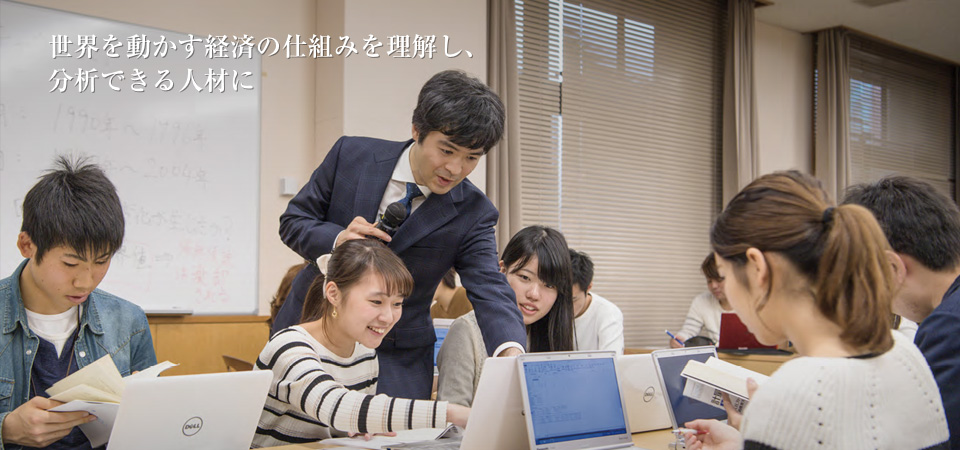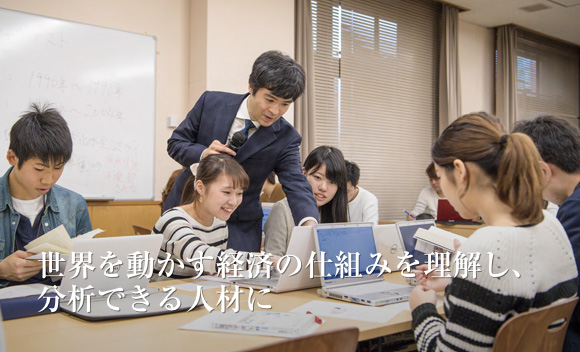Department of Economics
Department of Economics
Department of Business Administration
Department of International Business


Everybody performs economic transactions, working members of society and consumers alike. It is economics that analyzes the market mechanisms that support these economic transactions: Theories and proofs of market economies, public policy on social welfare, more sophisticated financial systems, complex enterprises and organizations with information going in every direction, realities of economic environments regulated by institutions and laws, globalized economic problems, the transformations of economies in a variety of different regions and eras. The ability to understand and analyze these aspects of economies is a strength of the talented person who will be in demand. We invite you to cultivate these strengths and aim to steadily acquire qualifications for a better career.
Economics
Content and Characteristics
Learning Economics by the Three-Course System
Learning Economics by the Three-Course System
Select from three courses of study according to your interests and aptitudes:
(1) Policy Analysis Course: Make a thoroughgoing study of theory and pragmatic analysis, and learn about public policy
(2) Corporate and Institutional Design Course: Understand the mechanisms of economies in terms of how real-world enterprises and organizations come about
(3) Global Studies Course: Know the realities of global economic development in a variety of different regions and eras
Educational Techniques Using Case Studies, Workshops, and Field Surveys
An introduction to economics taught in small groups is offered from the first year. Its focus is on teaching statistics, PC skills for data analysis, and skills in expression by means of information telecommunications. From the second year, courses start to strengthen the specialization in economics, and a complete selection of courses is also offered in development of critical awareness and testing hypotheses from on-the-ground learning in social participation workshops, internships, case study research, field studies, and so on.
International Human Resource Development Program
We offer a variety of international exchange programs intended to develop global human resources. We have study systems in place to support English and Chinese language learning. Coordinated with workshops, seminars, and field studies, these develop the abilities to act and to originate communication in a global environment.
Four-Year Program Flow
First year: Liberal arts and a foundation in economics
In addition to liberal arts courses, study computer, statistics, and mathematics subjects to develop data processing and analytical ability, and languages for communications. Also develop foundation skills in logic, reasoning, analysis, language, and economics by introductory courses such Introduction to Microeconomics, Introduction to Macroeconomics, Foundation Seminar, and Present-Day Societies and Economies.
Second year: Select course of study to belong to and study foundational courses
Select a course of study, and a career path linking it to a specialized field can be mapped out. For example, macro and micro theory together with pragmatic analysis lead to civil servant or tax accountant; financial and economic systems lead to financial planner; corporate and organizational functions lead to business administration skills; law and the economy lead to advancement to business school; case study research and overseas field studies lead to foreign activity; and so on.
Third year: Study higher-level specialized courses. Join a seminar group and research a topic.
Working in accordance with the specialized area of the selected course of study, take specialized courses at higher levels of specialization. In the third year, students also choose and join a seminar group, and while pursuing deeper research, they take internships and engage in other such activities to clarify the design of their career path. For students who wish to advance to graduate school, we also recommend the early admission system that allows students to advance directly from the third year.
Fourth year: Work up research results into the graduation thesis
Students can freely determine their Graduation Research. With guidance from their seminar instructor, they probe more deeply into research on their topic while working up their research results into their graduation thesis. A wide range of research topic results are presented at the graduation thesis presentation sessions.
